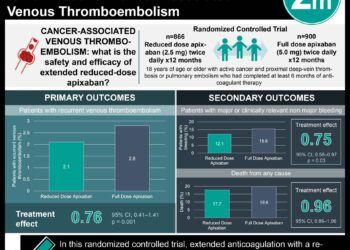Aspirin treatment without indication in patients on direct oral anticoagulants may increase the risk of bleeding events
1. In patients treated with direct oral anticoagulants (DOACs) for atrial fibrillation or venous thromboembolism (VTE), adding aspirin (ASA) was associated with increased bleeding events.
2. Adding ASA to DOAC treatment for patients with atrial fibrillation or VTE did not improve the incidence of thrombotic events.
Evidence Rating Level: 2 (Good)
Study Rundown: Aspirin (ASA), a nonselective COX inhibitor, is a drug generally prescribed to prevent and manage coronary artery disease, peripheral vascular disease, and stroke. ASA use, however, is not currently indicated for nonvalvular atrial fibrillation or venous thromboembolism (VTE), whose mainstay of treatment primarily consists of direct oral anticoagulation (DOAC). This registry-based cohort study compared the frequency of ASA prescribed with DOAC therapy versus DOAC therapy alone in patients with uncomplicated atrial fibrillation or VTE; both groups were also assessed for clinical outcomes. Approximately one-third of patients without an indication for ASA received DOAC-ASA compared to two-thirds of patients who received DOAC alone. DOAC-ASA dual therapy led to significantly more total bleeding events, higher nonmajor bleeding rates, and increased hospitalizations for bleeding than DOAC monotherapy. Both groups had comparable rates of thrombotic events and mortality. Overall, DOAC-ASA treatment was associated with higher bleeding rates and similar rates of thrombotic events compared to DOAC treatment alone. One limitation was that since it was a cohort study, ASA use was not randomized among patients but rather prescribed based on physicians’ clinical decisions; however, selection bias was reduced using propensity score matching. Another important limitation of this study was that, to achieve sufficient power, patients with VTE and atrial fibrillation were studied together. It is not clear if each of these pathologies have different risks associated with ASA-DOAC therapy.
Click to read the study in JAMA
Relevant Reading: Use and associated risks of concomitant aspirin therapy with oral anticoagulation in patients with atrial fibrillation
In-Depth [prospective cohort]: Between January 2015 and December 2019, 3280 patients (mean 68.2 years) from four medical centers in Michigan were included in this registry-based study. Patients were treated with a DOAC for atrial fibrillation or VTE and had no clear indication for ASA use. The primary outcome was the rate of bleeding events. Secondary outcomes included major bleeding events, nonmajor bleeding events, hospitalizations due to bleeding, and thrombotic events. 1107 (33.8%) patients were treated with DOAC-ASA dual therapy. Total bleeding events were significantly higher in DOAC-ASA treatment (31.6 [95% CI: 30.54-32.75] per 100 patient-years) compared to DOAC monotherapy (26.0 [95% CI: 25.05-27.06]) per 100 patient-years (p<0.01). Nonmajor bleeding rates (26.10 [95% CI: 25.14-27.15 vs. 21.70 [95% CI: 20.77-22.60] per 100 patient-years; p= 0.02) and hospitalizations for bleeding (8.20 [95% CI: 7.62-8.75] vs. 5.30 [95% CI: 4.87-5.78] per 100 patient-years; p<0.01) were significantly increased in patients treated with DOAC-ASA. There was no significant difference in new thrombotic events between patients treated with dual therapy (2.50 [95% CI: 2.20-2.83] per 100 patient-years) versus patients treated with DOAC monotherapy (2.30 [95% CI: 1.98-2.59] per 100 patient-years) (p= 0.80).
Image: PD
©2021 2 Minute Medicine, Inc. All rights reserved. No works may be reproduced without expressed written consent from 2 Minute Medicine, Inc. Inquire about licensing here. No article should be construed as medical advice and is not intended as such by the authors or by 2 Minute Medicine, Inc.







